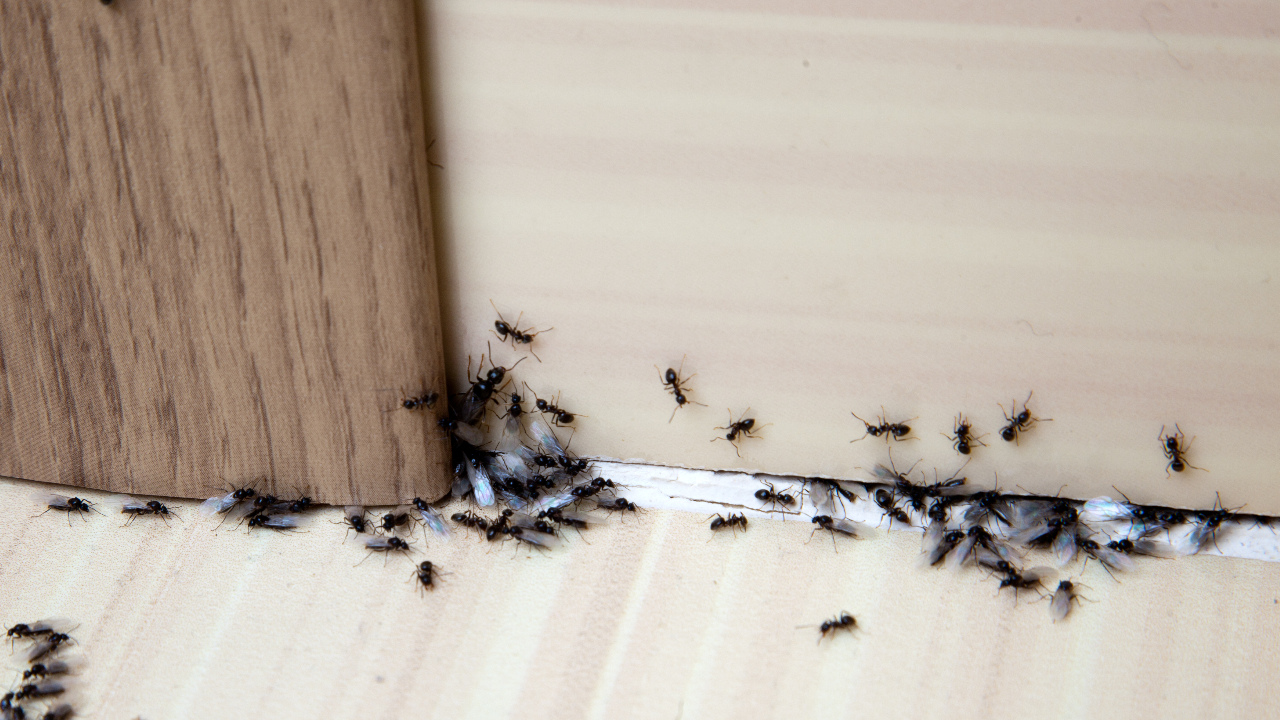10 Ways to Get Rid of Sugar Ants in Your Home

Sugar ants invade your home while looking for something sweet to devour in your kitchen. Although these unwanted pests are a nuisance, there are ways of getting rid of them without calling an exterminator or resorting to harmful pesticides.
What Americans call “sugar ants” are actually carpenter, pavement, rover, acrobat, pharaoh, Argentine, or little black ants. We call them “sugar ants” because they will seek out sugar, cookies, honey, molasses, jelly, fruit, syrup, or any sweet that is not tightly sealed in a container.
According to Native Pest Management, there are several things that you can do to get rid of these minuscule kitchen thieves.
Prepare Borax-And-Sugar Baits

Borax is a white, crystalline substance made up of hydrated sodium borate that has several uses, including as a pesticide.
Bulwark Exterminating suggests mixing 1/2 cup of sugar with 1 1/2 tablespoons of borax and warm water. Place the thick paste on little pieces of cardboard and position them near where you have seen ant activity in your kitchen. Although effective, people who have pets and small children may wish to opt for another listed method to deter ants.
Make a Citrus-Peel Infusion

According to Earth’s Best Natural Pest Management, citrus peels have a substance called d-limonene that ants find as repulsive as kids find brussels sprouts.
Chop up some citrus peels and let them simmer in water for 10 to 15 minutes. After the solution cools, strain the liquid into a spray bottle and spray around cracks and entry points to your kitchen.
Plant Mint and Bay Leaves

Ants are attracted to your kitchen because they smell something sweet, so why not plant something that they don’t like?
According to StaySafe.org, mint and bay leaves each have a strong scent that ants despise. Plant these herbs around the base of your house’s foundation and near entryways, if possible. Pruning the plants regularly will ensure that their ant-deterring powers remain potent.
Be Proactive

Scout ants leave a pheromone-based scent trail so that other ants can find their way back to your sugar stash.
To prevent future sugar ant infestations, seal up entry points with caulk, store food in airtight containers, wipe countertops regularly with a soapy solution that will eradicate scent trails, and regularly dispose of food waste left in the kitchen wastebasket.
If you take these preventative measures and try some of the other deterrents on this list, sugar ants will have to seek out someone’s else’s kitchen for their sugar fix.
Spray a Vinegar Solution

Think of white vinegar as kryptonite for ants.
Mix equal parts vinegar and water and put in a spray bottle. Shake the mixture well and spray it around doors, windowsills, countertops, and any cracks in which ants might enter your kitchen. Some vinegar a day keeps the ants away from your apples and other sweets. Instead of vinegar, you can also use lemon juice for the same effect.
Boil the Ant Nest

If you know where the nearest ant nest is located outside of your kitchen, you can literally stop the little pests in their tracks with boiling water.
First, boil some water and then take it outside to pour over areas near pavement cracks or your house’s foundation where you see a lot of ant activity. Not only will the boiling water instantly kill ants and disrupt the colony, it will boil away the ants’ scent trail leading directly to your kitchen.
Apply Peppermint Oil

Peppermint oil is a natural ant repellant that many may find produces a more pleasant scent than spraying vinegar or lemon everywhere.
Create a mixture in a spray bottle of water and several drops of peppermint oil. Spray the solution in areas where you have seen ants in the kitchen, especially around windows, doors, and cracks in the wall. Reapply the minty solution often to send a strong message to ants that they shall not pass, kind of like Gandalf did with the Balrog in The Lord of the Rings: The Fellowship of the Ring.
Spread Diatomaceous Earth

Diatomaceous earth is soft, sedimentary rock that can be crumbled into a fine white powder. Sugar ants may be attracted to sugar, but this similar-looking white powder will dehydrate and kill ants.
Lightly sprinkle diatomaceous earth along ant trails and near entry points in your kitchen. If the powder becomes wet after cleaning the area or for some other reason, just sprinkle some more to create an unsafe passage for ants.
Mix Baking Soda With Powdered Sugar

Ants are coming into your kitchen to get sugar, so creating a mixture of baking soda with powdered sugar creates a lethal Trojan horse that the ants will unwittingly take back to their nest.
Mix one part baking soda with powdered sugar and place the mixture in the underside of a lid near an ant trail. The ants will be attracted to the sugar and take it along with the baking soda back to the nest, potentially killing the whole colony.
Lay down Coffee Grounds

You may like sugar in your coffee, but ants insist on sugar sans any coffee at all, thank you very much.
Since coffee grounds naturally repel ants, spread some outside along the perimeter of your home, especially near entryways. Also sprinkle some in nearby garden beds where you have seen ants gathering.





